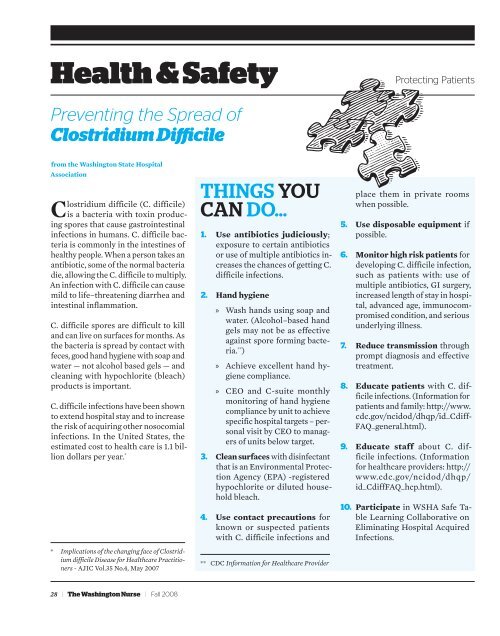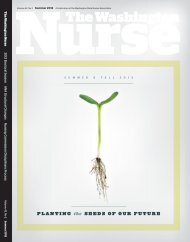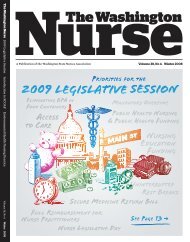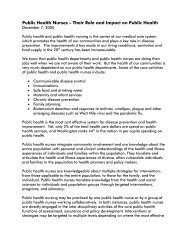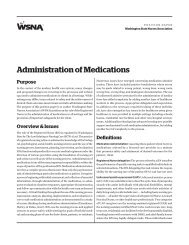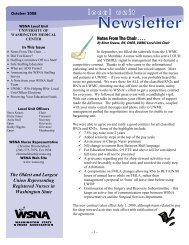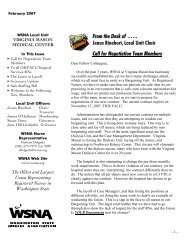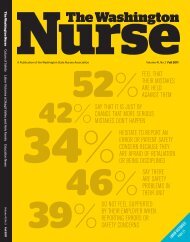Issue 38.3 - Fall 2008 - The Washington State Nurses Association
Issue 38.3 - Fall 2008 - The Washington State Nurses Association
Issue 38.3 - Fall 2008 - The Washington State Nurses Association
You also want an ePaper? Increase the reach of your titles
YUMPU automatically turns print PDFs into web optimized ePapers that Google loves.
Health & Safety<br />
Protecting Patients<br />
Preventing the Spread of<br />
Clostridium Difficile<br />
from the <strong>Washington</strong> <strong>State</strong> Hospital<br />
<strong>Association</strong><br />
Clostridium difficile (C. difficile)<br />
is a bacteria with toxin producing<br />
spores that cause gastrointestinal<br />
infections in humans. C. difficile bacteria<br />
is commonly in the intestines of<br />
healthy people. When a person takes an<br />
antibiotic, some of the normal bacteria<br />
die, allowing the C. difficile to multiply.<br />
An infection with C. difficile can cause<br />
mild to life–threatening diarrhea and<br />
intestinal inflammation.<br />
C. difficile spores are difficult to kill<br />
and can live on surfaces for months. As<br />
the bacteria is spread by contact with<br />
feces, good hand hygiene with soap and<br />
water — not alcohol based gels — and<br />
cleaning with hypochlorite (bleach)<br />
products is important.<br />
C. difficile infections have been shown<br />
to extend hospital stay and to increase<br />
the risk of acquiring other nosocomial<br />
infections. In the United <strong>State</strong>s, the<br />
estimated cost to health care is 1.1 billion<br />
dollars per year. *<br />
* Implications of the changing face of Clostridium<br />
difficile Disease for Healthcare Practitioners<br />
- AJIC Vol.35 No.4, May 2007<br />
Things You<br />
Can Do...<br />
1. Use antibiotics judiciously;<br />
exposure to certain antibiotics<br />
or use of multiple antibiotics increases<br />
the chances of getting C.<br />
difficile infections.<br />
2. Hand hygiene<br />
»»<br />
Wash hands using soap and<br />
water. (Alcohol–based hand<br />
gels may not be as effective<br />
against spore forming bacteria.<br />
** )<br />
»»<br />
Achieve excellent hand hygiene<br />
compliance.<br />
»»<br />
CEO and C-suite monthly<br />
monitoring of hand hygiene<br />
compliance by unit to achieve<br />
specific hospital targets – personal<br />
visit by CEO to managers<br />
of units below target.<br />
3. Clean surfaces with disinfectant<br />
that is an Environmental Protection<br />
Agency (EPA) -registered<br />
hypochlorite or diluted household<br />
bleach.<br />
4. Use contact precautions for<br />
known or suspected patients<br />
with C. difficile infections and<br />
** CDC Information for Healthcare Provider<br />
place them in private rooms<br />
when possible.<br />
5. Use disposable equipment if<br />
possible.<br />
6. Monitor high risk patients for<br />
developing C. difficile infection,<br />
such as patients with: use of<br />
multiple antibiotics, GI surgery,<br />
increased length of stay in hospital,<br />
advanced age, immunocompromised<br />
condition, and serious<br />
underlying illness.<br />
7. Reduce transmission through<br />
prompt diagnosis and effective<br />
treatment.<br />
8. Educate patients with C. difficile<br />
infections. (Information for<br />
patients and family: http://www.<br />
cdc.gov/ncidod/dhqp/id_Cdiff-<br />
FAQ_general.html).<br />
9. Educate staff about C. difficile<br />
infections. (Information<br />
for healthcare providers: http://<br />
www.cdc.gov/ncidod/dhqp/<br />
id_CdiffFAQ_hcp.html).<br />
10. Participate in WSHA Safe Table<br />
Learning Collaborative on<br />
Eliminating Hospital Acquired<br />
Infections.<br />
28 | <strong>The</strong> <strong>Washington</strong> Nurse | <strong>Fall</strong> <strong>2008</strong>


